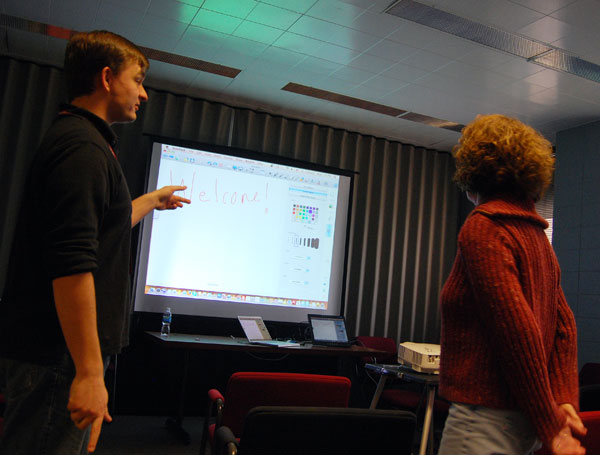Scott Vanek: Academic Computing Manager Supports Sciences, Mathematics

Q: Scott, when did you begin your Wesleyan career in Information Technology Services?
A: I arrived in mid-September 2008.
Q: You’re currently the academic computing manager for the Natural Sciences and Mathematics area. Do you generally support faculty?
A: Supporting faculty takes up most of my time. However, because grad-students work closely with faculty, I have also been supporting grad-students in certain situations. For example, a grad student may need assistance with Wesfiles or Blackboard and I would assist him or her. Additionally, I may also conduct specific training for a class of undergrads.
Q: Is supporting NSM any different than supporting say, the Arts and Humanities? Is there any science and match-specific software or hardware that you need to be familiar with?
A: Each discipline has its own specific instructional technology needs, so there are certainly differences. In the past, at Trinity College, I have supported both humanities faculty and Natural Science and Mathematics faculty and I experienced the differences first hand. For example, faculty in chemistry may use software that faculty in English would never use, such a molecular modeling software. However, there are similarities. Faculty across all disciplines use Blackboard and Wesfiles for example.
Q: How many total machines do you oversee in NSM? Also, does your position include server and printer support?
A: I don’t specifically oversea a set number of machines. My job is to work with faculty in support of their instructional technology needs. Desktop support services supports the machines in NSM. I do not directly support servers or printers, though I might work with another staff member in ITS to make sure that a server is setup for a specific instructional technology need, such as making sure a license manager is working properly on a server.
Q: What are typical problems NSM staff and faculty contact you for?
A: The types of questions NSM faculty and staff approach me with can vary. Faculty can call me looking for help with Wesfiles, Blackboard, or webpage editing, for example. Faculty also approach me with requests for help researching and acquiring software and for help answering questions about how technology can best be used in their classes.
Q: What goes on during your day? Are you mostly out, meeting with “clients” or can you do work remotely?
A: My typical word day is a mix of ITS meetings, meetings with faculty or staff, and working at my desk. On some days, I’ll be very busy with meetings, while on others I’ll be working on projects at my desk. The time of year can dictate what my typical day is. At the beginning of each semester, I’m very busy helping faculty get ready for their classes and making sure their requests are done in a timely fashion.
Q: Is every day a new challenge?
A: Since I’m new to Wesleyan, new challenges are not hard to find. As I get used to how ITS at Wesleyan operates, I expect new challenges will pop up less frequently.
Q: What do you like best about working at Wesleyan?
A: I enjoy the atmosphere at Wesleyan. I knew immediately, after arriving at Wesleyan, that I would enjoy working here. Additionally, working with faculty and staff who are passionate about their jobs makes working at Wesleyan enjoyable.
Q: Who are the other members of the academic computing support team?
A: My other colleagues are Kevin Wiliarty, ACM for the Social Sciences, and Dan Schnaidt, ACM for the Arts and Humanities. My supervisor is Jolee West. All three have been great to work with. Our jobs can overlap at times, but that’s only when we are working on a project that impacts the entire faculty population at Wesleyan, as opposed to impacting a single division. We do help each other out, particularly if one of use has expertise in a particular software product or subject.
Q: Where did you attend college and what did you major in? What were you doing before working at Wesleyan?
A: I received my bachelor’s degree from the University of Vermont in wildlife biology. I received my master’s degree at the University of Hartford in Educational Technology. Before working at Wesleyan, I worked for more than eight years at Trinity College as an instructional technologist.
Q: What are your hobbies/interests? Family? Where are you from?
A: Currently, my hobbies include road biking (when it’s above 40 degrees) and playing hockey. I enjoy reading science fiction and alternative history. I am also an assistant high school hockey coach so when I’m not at work, I’m on the ice. I grew up in Manchester, Conn. and currently live in Windsor, Conn. with my wife Shaina.

